The Bernoulli Lectures for the Behavioral Sciences honour researchers who have contributed significantly to the development of the behavioural sciences.
The next Bernoulli Lecture will take place
Tuesday, April 14th, 2026
More information will be available soon.
A list of past Bernoulli lecturers can be found below.
2025, 13th Bernoulli Lecture: Prof. Dr. Andrew Oswald, University of Warwick
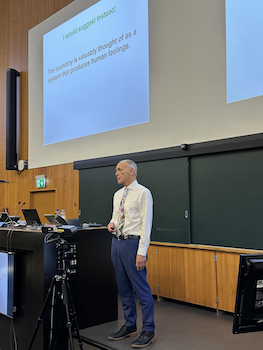
Is it time to question standard thinking on the economy, climate change, and human happiness?
This lecture will cautiously disagree with four ideas that Western society tends to take for granted: 1. Economic growth remains a desirable objective. 2. Increasing temperatures are leading to the rising numbers of natural disasters that we observe. 3. Most human beings care about climate change. 4. The best way forward on climate-change would be to adopt economists’ solutions on carbon pricing, etc. The lecture will describe evidence inconsistent with these four ideas and suggest where we go from here.
2024, 12th Bernoulli Lecture: Prof. Dr. Linda Steg, University of Groningen

Encouraging Climate Action
Climate change is caused by human behaviour and can thus be reduced when people would more consistently engage in climate actions. I will discuss which factors motivate climate actions. Moreover, I explain why people may not always engage in climate actions, and how consistent climate actions can be promoted.
2023, 11th Bernoulli Lecture: Prof. Dr. Peter Dayan, Max Planck Institute for Biological Cybernetics
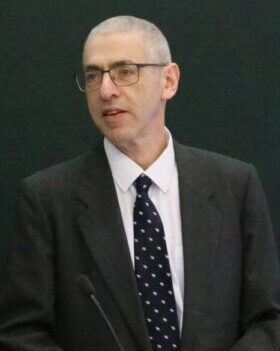
Risk in Sequential Decisions
Since the days of the Bernoullis themselves, risky decision-making has attracted substantial theoretical and empirical study. There are marked differences between the risk attitudes of different people, and extremes are associated with psychiatric dysfunctions, notably in anxiety disorders. Most work in the area has focused on isolated decisions, such as separate lotteries or bets; but most decision-making involves whole trajectories or sequences of choices and outcomes, allowing peril to accumulate. In his lecture, Dayan will discuss the recent theoretical and experimental work in this domain. This is joint work with Kevin Chen, Chris Gagne, Kevin Lloyd and Xin Sui.
2022, 10th Bernoulli Lecture: Prof. Dr. Karen Douglas, University of Kent, UK
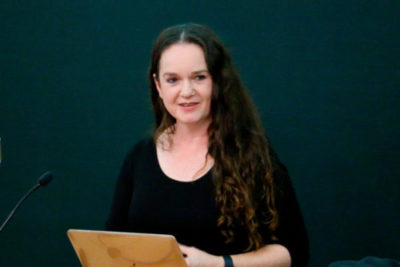
Consequences of conspiracy theories
Karen Douglas is a Professor of Social Psychology at the University of Kent, UK. She is currently the director of the ERC-funded project “CONSPIRACY_FX – Consequences of conspiracy theories“. Prof. Douglas studies the psychology of conspiracy theories. Her research examines why conspiracy theories appeal to so many people, and the consequences of conspiracy theories for individuals, groups, and society. In her lecture, Douglas focused on what psychologists know about why people believe in conspiracy theories, what their consequences are, and why people share them.
2019, 9th Bernoulli Lecture: Prof. Dr. Angela Duckworth, University of Pennsylvania, USA
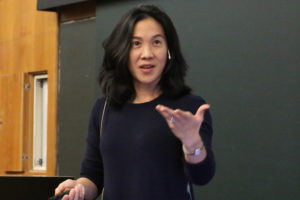
Strategic self-control
Angela Duckworth uses psychological science to understand how individuals exercise self-control to achieve their goals. Duckworth’s research suggests that passion and perseverance— a combination that she calls “grit”—are crucial to reaching one’s objectives and may be as important, or more so, than talent and intellect in fueling success. In her lecture, Duckworth focused on strategic approaches to exerting self-control that ease resistance to short-term temptation in several domains of life.
2018, 8th Bernoulli Lecture: Prof. John List, University of Chicago, USA
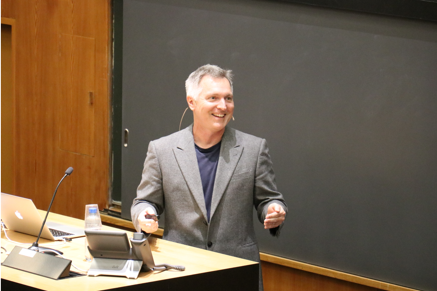
Using field experiments to make the world a better place
Field experiments can help us to learn about the economics of life and to improve people’s outcomes. Field experiments have generated data that has provided insights into many issues, including pricing behavior, discrimination in the marketplace, the valuation of non-marketed goods and services, public good provisioning, behavioral anomalies, charitable giving, auction theory, and the role of the market in the development of rationality. In his lecture, John List focused on how to use field experiments to make the world a better place through a wide range of issues, including charitable giving, education, lowering inequality and helping organizations as varied as Uber and the UK government.
2017, 7th Bernoulli Lecture: Prof. Dr. Brian Knutson, Stanford University, USA
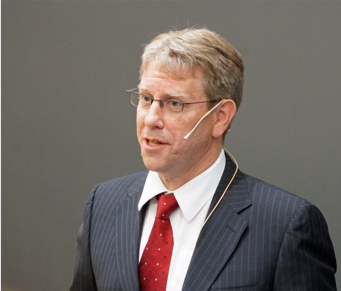
Towards a Neural Basis for Expected Utility
Increasing resolution of neuroimaging techniques has allowed investigators to track changes in neural activity not only resulting from, but also in anticipation of choice. This has supported identification of circuits that respond to the magnitude and probability of expected gains and losses, as well as determination of whether their activity can also predict upcoming choice. Even more recent evidence suggests that beyond predicting individual choice, activity in some of these circuits may forecast aggregate choice. Although not a perfect match, these collected findings imply that in less than two decades, researchers are converging on a neural basis for expected utility.
2016, 6th Bernoulli Lecture: Prof. Dr. Vernon L. Smith, Chapman University, USA (Nobel Memorial Prize in Economic Sciences, 2002)
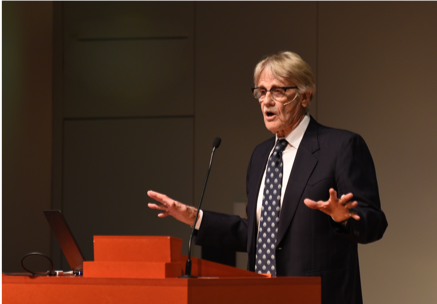
You Learn the Most When You Find Your Beliefs to be False: Three Examples from Experimental Economics
The lecture addressed three propositions that were once commonly believed by economists, but that were not valid: First, in the 1960s there was the belief that efficient competitive market outcomes are not attainable in the absence of complete information on supply and demand. Second, in 1980s, the belief that price bubbles in asset markets will not occur if asset value is known and transparent. Third, in the 1990s, the belief that anonymously matched people will fail to cooperate in single play trust games.
Laboratory experiments were prominent in transforming these false beliefs and the process of overcoming professional resistance to these propositions was instrumental to the acceptance of the subfield of experimental economics—a quite unintended consequence of that exploration process. Smith used these examples to argue that it is when we challenge the validity of our personal beliefs that we stand to learn the most; when we must reexamine what we think we know, and learn from the experience.
2015, 5th Bernoulli Lecture: Prof. Dr. Ulrike Malmendier, University of California, Berkeley, USA

The Role of Lifetime Experiences in Decision Making
Traditional economic approaches leave little room for people being shaped by their lifetime experiences. Psychologists have long argued to that a personal experience leaves a different impact on individuals’ beliefs and willingness to take risks than “learned” information. An emerging literature on “experience effects” incorporates psychological underpinnings such as the availability heuristic and recency bias into economic models. This literature has been successful in explaining some of the most significant financial decisions individuals make over their lifetimes, including the decision to buy a house, what mortgage to pick, or whether to invest in the stock market. This lecture will provide an overview of recent findings and challenges in the field.
2013, 4th Bernoulli Lecture: Prof. Dr. David Laibson, Harvard University, USA
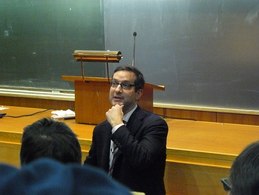
Can We Control Our Selves? Policy Design for Agents with Self-Control Problems
Agents have difficulty managing themselves. Self-control problems, sometimes coupled with a lack of self-knowledge about these problems, leads agents to make self-defeating choices in many important domains, such as savings, exercise, health care adherence, and educational attainment. In this talk Prof. Laibson discusses a range of policies that are designed to help agents with self-control problems make fewer self-defeating decisions.
2012, 3rd Bernoulli Lecture: Prof. Dr. Michael Tomasello, Max Planck Institute for Evolutionary Anthropology, Germany
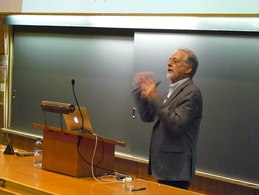
Human Collaboration
Although great apes collaborate for some purposes, recent studies comparing chimpanzees and human children suggest that human collaboration is unique both cognitively and motivationally. In particular humans seem adapted for collaborative foraging, as even young children display numerous relevant mechanisms, from special ways of coordinating and communicating to special ways of sharing food to special forms of social evaluation. The Shared Intentionality hypothesis specifies the ontogeny of these underlying mechanisms and their consequences for both human cognition and human social life.
2011, 2nd Bernoulli Lecture: Prof. Dr. Ernst Fehr, University of Zurich, Switzerland
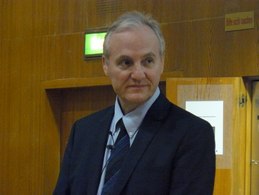
Die Rolle von Eigennutz und Gemeinnutz in Wirtschaft und Gesellschaft
Im täglichen Leben verhält sich der Mensch teilweise eigennützig und teilweise gemeinnützig. Im Vortrag wird gezeigt, unter welchen Bedingungen gemeinnütziges Verhalten dominiert, und wann der Eigennutz obsiegt. Die Erkenntnisse aus wissenschaftlichen Experimenten zeigen, dass bei vielen Menschen eine Bereitschaft zur freiwilligen Kooperation existiert, diese Bereitschaft aber nicht ausreicht, um allgemeine Kooperation zu erzeugen. Anreize und Sanktionsmöglichkeiten sind daher notwendig. Sanktionen sind vor allem dann wirksam, wenn zivile Kooperationsnormen stark sind und die Bestrafung von Regelverletzungen als legitim anerkannt wird. Der Vortrag wird auch neuere Erkenntnisse über die neuronalen Grundlagen von Kooperations- und Sanktionsverhalten berücksichtigen.
2010, 1st Bernoulli Lecture: Prof. Dr. Gerd Gigerenzer, Max Planck Institute for Human Development, Germany
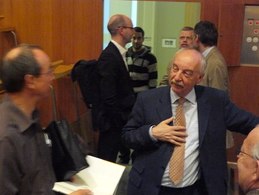
Wie trifft man gute Entscheidungen?
Im Jahre 1738 gelang Daniel Bernoulli ein großer Durchbruch mit der Entwicklung der Grundlagen der modernen Entscheidungstheorie. Deren Motto ist „erst wägen, dann wagen“ und „erst denken, dann handeln.“ Hat uns diese geholfen, bessere Entscheidungen zu treffen? Warum urteilen dennoch Manager immer wieder aus „dem Bauch“ heraus, und wieso verlässt sich Otto Normalverbraucher bei der Wahl eines Jobs oder Lebenspartners auf Gefühl statt Logik? Dieser Vortrag gibt einen Einblick in die Forschung, die zeigt, dass einfache, intuitive Entscheidungsregeln oft zu besseren Ergebnissen führen als komplexe statistische Software-Pakete. Weniger kann mehr sein.